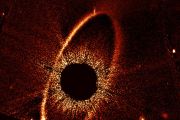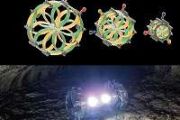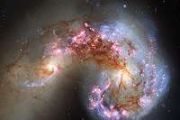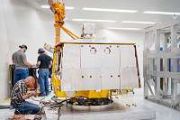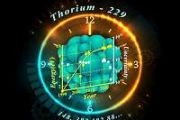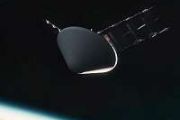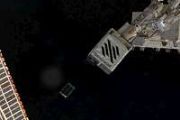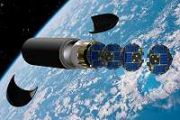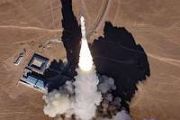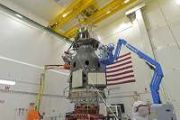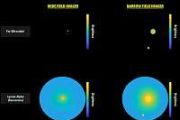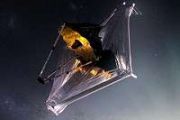
Copernical Team
Greece deploys first national ICEYE radar satellites for disaster monitoring
 Two new ICEYE radar satellites have entered service under Greece's National Small Satellite Programme, expanding the country's capacity to track floods, wildfires, landslides and other hazards as well as areas of security interest on land and at sea.
The pair of synthetic aperture radar spacecraft were launched on 28 November 2025 on SpaceX's Transporter-15 rideshare mission from Vandenber
Two new ICEYE radar satellites have entered service under Greece's National Small Satellite Programme, expanding the country's capacity to track floods, wildfires, landslides and other hazards as well as areas of security interest on land and at sea.
The pair of synthetic aperture radar spacecraft were launched on 28 November 2025 on SpaceX's Transporter-15 rideshare mission from Vandenber Gels may have given early Earth chemistry a place to organize into life
 An international team from Japan, Malaysia, the UK, and Germany has proposed that life on Earth may have emerged within sticky, surface-bound gels that formed before the first cells. The researchers argue that these prebiotic gels, attached to mineral or other surfaces, could have provided both structure and chemical environments that helped early chemistry progress toward biology.
The tea
An international team from Japan, Malaysia, the UK, and Germany has proposed that life on Earth may have emerged within sticky, surface-bound gels that formed before the first cells. The researchers argue that these prebiotic gels, attached to mineral or other surfaces, could have provided both structure and chemical environments that helped early chemistry progress toward biology.
The tea Small satellite mission targets maritime activity monitoring from orbit
UK plasma thruster test positions Pulsar Fusion for larger satellite propulsion
 Pulsar Fusion and partners have tested what they describe as the largest space plasma engine yet fired in Britain, designed to provide high-thrust in-space propulsion for heavier satellites. The engine, which the company reports is roughly ten times larger than its previous plasma thrusters, was demonstrated at the University of Southampton on 29 January in a large vacuum chamber to replicate on
Pulsar Fusion and partners have tested what they describe as the largest space plasma engine yet fired in Britain, designed to provide high-thrust in-space propulsion for heavier satellites. The engine, which the company reports is roughly ten times larger than its previous plasma thrusters, was demonstrated at the University of Southampton on 29 January in a large vacuum chamber to replicate on NASA extends ISS National Lab management contract through 2030
 The Center for Advancement of Science in Space will continue to manage the International Space Station National Laboratory for at least another five years, CASIS announced on Thursday.
CASIS has managed the ISS National Lab since 2011, after Congress created it to enable researchers to build a "robust market" in low Earth orbit by leveraging the unique environment that exists in space, CAS
The Center for Advancement of Science in Space will continue to manage the International Space Station National Laboratory for at least another five years, CASIS announced on Thursday.
CASIS has managed the ISS National Lab since 2011, after Congress created it to enable researchers to build a "robust market" in low Earth orbit by leveraging the unique environment that exists in space, CAS Congress warned that the U.S. faces a new space race with China
 The United States has entered a consequential new era of competition with China in space - one that lawmakers said will shape global power, economic security and military advantage for generations.
House Science, Space and Technology Space and Aeronautics Subcommittee Chairman Mike Haridopolos, R-Fla., posed the issue during a hearing Thursday as a question for the future.
"Will huma
The United States has entered a consequential new era of competition with China in space - one that lawmakers said will shape global power, economic security and military advantage for generations.
House Science, Space and Technology Space and Aeronautics Subcommittee Chairman Mike Haridopolos, R-Fla., posed the issue during a hearing Thursday as a question for the future.
"Will huma Space debris: Will it take a catastrophe for nations to take the issue seriously?
Verifying that you are not a bot
Satellite surge threatens space telescopes, astronomers warn
 Light from the half a million satellites that humanity is planning to launch into Earth's orbit in the coming years could contaminate almost all the images taken by space telescopes, NASA astronomers warned Wednesday.
Scientists have already been sounding the alarm about how light pollution from increasingly massive satellites threaten the future of dark skies seen from the ground.
Now,
Light from the half a million satellites that humanity is planning to launch into Earth's orbit in the coming years could contaminate almost all the images taken by space telescopes, NASA astronomers warned Wednesday.
Scientists have already been sounding the alarm about how light pollution from increasingly massive satellites threaten the future of dark skies seen from the ground.
Now, Isolation and bed rest volunteers sought for future spaceflight research
 DLR and ESA are recruiting volunteers for two human research campaigns at the :envihab aerospace medicine facility in Cologne that will simulate key aspects of long duration missions beyond low Earth orbit. The SOLIS100 isolation study will place six participants in a confined, spacecraft like habitat for 100 days, while the SMC3 bed rest study will keep 12 volunteers in head down tilt for 60 da
DLR and ESA are recruiting volunteers for two human research campaigns at the :envihab aerospace medicine facility in Cologne that will simulate key aspects of long duration missions beyond low Earth orbit. The SOLIS100 isolation study will place six participants in a confined, spacecraft like habitat for 100 days, while the SMC3 bed rest study will keep 12 volunteers in head down tilt for 60 da Martian butterfly crater reveals low angle impact and buried lava history
 ESA's Mars Express orbiter has observed an impact crater in Mars's northern lowlands whose shape resembles a butterfly, created when an incoming space rock struck the surface at a shallow angle. The main crater, which appears somewhat like a walnut from orbit, measures about 20 km east to west and 15 km north to south and sits within the Idaeus Fossae region. The impact threw material preferenti
ESA's Mars Express orbiter has observed an impact crater in Mars's northern lowlands whose shape resembles a butterfly, created when an incoming space rock struck the surface at a shallow angle. The main crater, which appears somewhat like a walnut from orbit, measures about 20 km east to west and 15 km north to south and sits within the Idaeus Fossae region. The impact threw material preferenti 

